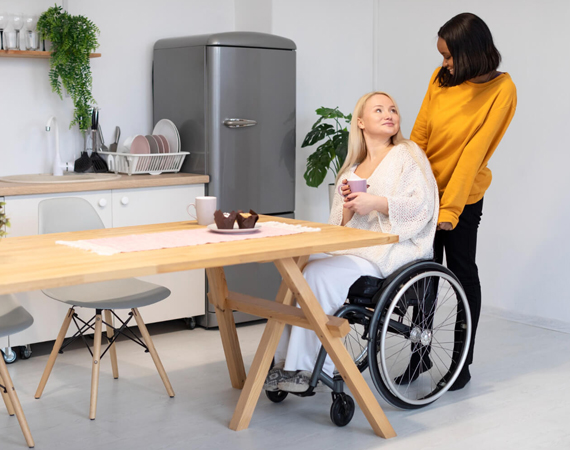Specialist Disability Accommodation (SDA) Services under the National Disability Insurance Scheme (NDIS) in Australia are designed to provide housing solutions for individuals with significant functional impairment or high support needs. These services offer specialized accommodations and support to enhance the independence, safety, and quality of life of people with disabilities. Here’s a detailed description of Specialist Disability Accommodation (SDA) Services under NDIS in Australia:
- Specialized Housing Options: SDA services encompass a range of specialized housing options tailored to the specific needs of individuals with disabilities. This may include purpose-built dwellings, group homes, supported apartments, or modified private rental properties designed to meet accessibility and support requirements.
- Accessibility Features: SDA accommodations are designed with a focus on accessibility and inclusivity. They may include features such as wheelchair ramps, widened doorways, modified bathrooms, adjustable countertops, sensory-friendly design elements, and assistive technology installations.

- High-Level Support: SDA services provide high-level support tailored to the individual’s functional impairment or support needs. This may include 24/7 support staff availability, on-site support coordination, specialized care services, health monitoring, medication management, and assistance with activities of daily living.
- Adaptations and Modifications: Accommodations provided through SDA services may include adaptations and modifications to support individuals with complex needs. This could involve customizing living spaces, installing assistive devices, sensory rooms, communication aids, and safety features to promote independence and well-being.
- Therapeutic Environments: SDA accommodations are designed to create therapeutic environments that support the individual’s physical, emotional, and sensory well-being. These environments may include sensory gardens, calming spaces, therapy rooms, and access to outdoor recreational areas.
- Community Integration: SDA services focus on promoting community integration and social inclusion for individuals with disabilities. Accommodations are located in proximity to community facilities, public transport, employment opportunities, recreational amenities, and social activities to facilitate participation and engagement.
- Individualized Support Plans: Each individual accessing SDA services has an individualized support plan developed in consultation with the participant, their family, carers, and support providers. The plan outlines specific support needs, goals, preferences, and strategies to achieve independence and quality of life.
- Tenancy and Lease Agreements: SDA services support participants in navigating tenancy arrangements, lease agreements, and understanding their rights and responsibilities as tenants. This includes assistance with rent payments, property maintenance, tenancy disputes, and accessing tenancy supports if needed.
- Transition Support: SDA services may offer transition support for individuals moving into SDA accommodations. This includes assistance with packing, moving logistics, setting up the new living environment, orientation to the property and its features, and settling into the community.
- Collaboration with Support Providers: SDA services collaborate closely with disability support providers, allied health professionals, community organizations, and government agencies to ensure coordinated and integrated support services. This includes accessing funding, linking to community resources, and coordinating care plans.
- Safety and Security: SDA accommodations prioritize safety and security measures to ensure the well-being of residents. This includes emergency response systems, fire safety protocols, building security, and risk management strategies.
Overall, Specialist Disability Accommodation (SDA) Services under NDIS in Australia aim to provide individuals with disabilities access to safe, suitable, and supportive housing options that meet their unique needs and promote independence, inclusion, and quality of life. These services play a crucial role in supporting individuals with complex needs to live in environments that facilitate their well-being, dignity, and community participation.
